
About 200 high school students from the greater Los Angeles area gathered on Tuesday at the California Endowment with one specific purpose: present solutions to civic social issues that affect their communities.
Students’ presentations included topics such as drugs use in teens, rent hikes, sexual assault, young workers, deportations, mental health and the impact of screen time, among many others.
Leila de Leon and her group from San Pedro High School focused on food insecurity. Shesaid this topic is often overlooked sometimes because it is sensitive and people try to avoid it.
“I see some friends, some classmates … worry about what they are going to have for dinner or what they are going to have for breakfast,” said de Leon.
Rhianna Lomer, a junior at Los Angeles Center for Enriched Studies, said that her group decided to bring up the topic of substance abuse, specifically alcohol and marijuana abuse. She said this is a common problem in communities, not only with adults but also with teens.
“We wanted to see what we could do in order to maybe reduce the substance abuse that goes in our communities,” said Lomer.

Students from Los Angeles Schools of Global Studies focused on rent hikes, creating a petition that will eventually be directed to L.A. City Councilwoman Eunises Hernandez, who represents the area where the school is located.
The students said many of the tenants affected are immigrant families that don’t know their rights, and they are trying to inform them.
“Sometimes landlords put fear on their tenants and they don’t know what to do,” said Angel Felix.
Caleb Coronado, another student at San Pedro High, said his group decided to focus on the recent wildfires. He said the topic became very important because even though they are further from the epicenter, they were still affected.
“We wanted to see what we can do as a society to help those who need to rebuild and also what we can do in the future to prevent those fires,” he said.
The students were part of the Civic Action Project (CAP) program, which helps students learn how to impact change in their community. CAP students examine social, cultural, and environmental issues and research related public policies to influence the decisions of policymakers in their communities.

Laila de León (right) and her group presented on food insecurity. (Photo by Jacqueline García)
The program was hosted by Teach Democracy, a nonprofit whose mission is to inspire lifelong civic engagement through interactive programs and resources for teachers and youth.
Gregorio Medina, senior program director with Teach Democracy, said the projects take between one to two semesters to complete and students present at the end of the spring semester.
Medina said the focus of the CAP program is to teach students that there is a process for influencing public policy to address their issues in their communities.
“What I frequently remind students is that you have a council member who is paid to live in your community and many don’t even know who that person is, and that person has a budget to hire a staff whose sole purpose is to respond to their feedback,” he said. “I call tha, their first civic action, to identify who your local representative is because they are determining how the money is spent in communities.”
Enhancing their public speaking skills
Students not only did the research and developed a presentation, but they also learned about public speaking skills by presenting to different groups that included educators and other peers.
Cruz Carrillo, senior at Global Studies, said he was nervous about presenting but was glad that he was able to do it. Karla Castro, also a senior at Global Studies, and her group did a presentation on deportations. She said while the topic was difficult they were comfortable speaking as they are taught public speaking skills at school.
Steve Delgado, who was part of Castro’s group, said they were able to engage with their audience and people did have some questions that they were able to answer.
Teach Democracy CEO Stephanie Doute said she was excited to see the presentations because the youth are the future and many of them will become the advocates and the activists that society needs.
“And we need young people to understand the power that they have,” she said.
Teach Democracy offers the program annually, engaging about 6,000 teachers and 200,000 high school and middle students nationwide. The nonprofit conducts outreach every year to CAP teachers, informing them about the program, reviewing applications and selecting the participants..
For more information visit: https://teachdemocracy.org/

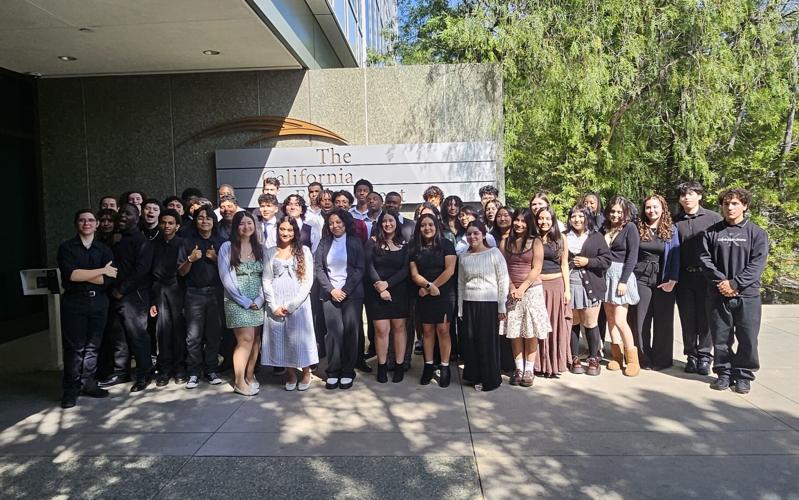
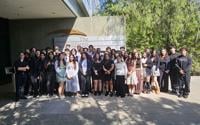

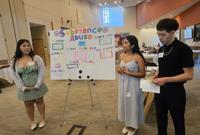

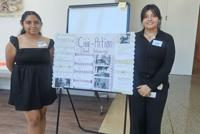



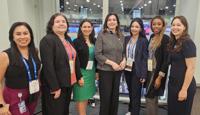



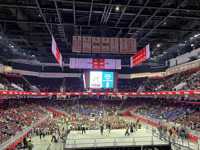
(0) comments
Welcome to the discussion.
Log In
Keep it Clean. Please avoid obscene, vulgar, lewd, racist or sexually-oriented language.
PLEASE TURN OFF YOUR CAPS LOCK.
Don't Threaten. Threats of harming another person will not be tolerated.
Be Truthful. Don't knowingly lie about anyone or anything.
Be Nice. No racism, sexism or any sort of -ism that is degrading to another person.
Be Proactive. Use the 'Report' link on each comment to let us know of abusive posts.
Share with Us. We'd love to hear eyewitness accounts, the history behind an article.